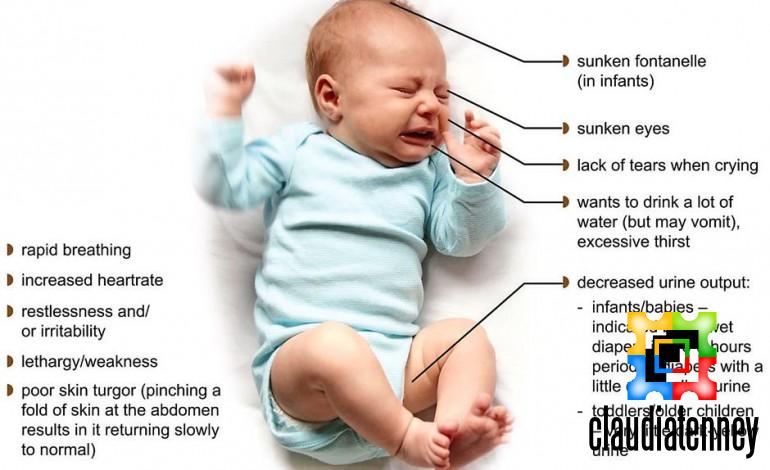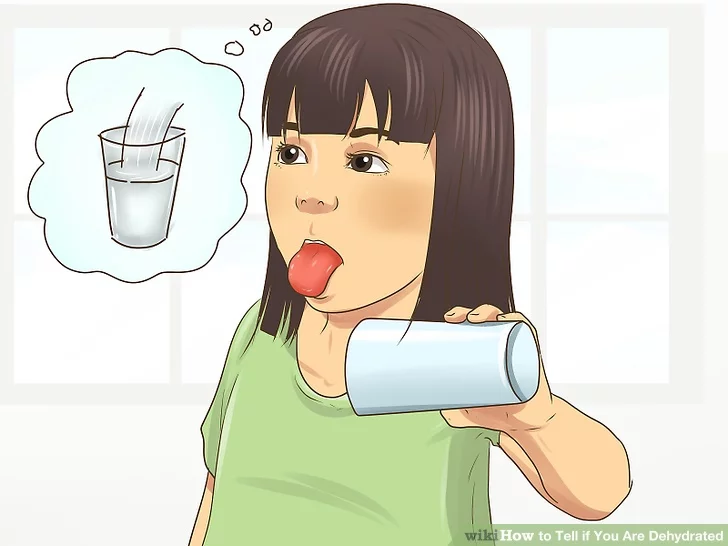Getting to know how to tell if your baby is dehydrated is important for you and your family. There are a variety of signs to look for. Some of them are headaches, cramps, and weakness. You can also check your baby’s urine color and urine frequency. If you find any of these symptoms, you should immediately begin rehydrating your baby.
Color of urine
Among the many questions a new parent may ask is, “What is the color of urine to tell if a baby is dehydrated?” There are a few different things you can learn from the color of urine.
There are several reasons that can cause the color of urine to change, ranging from a diet to medications. While not all changes in urine color are harmful, it is always a good idea to talk to a health professional before making any drastic changes.

Red urine is a common symptom of urinary tract infections. It can also indicate a more serious underlying condition, such as kidney stones.
Cramps
Keeping your baby hydrated is vital for their well-being. Dehydration can be caused by many things, but it is a dangerous condition. It can lead to brain damage and even death. If you notice that your baby is not drinking enough, you should immediately seek medical advice.
Dehydration occurs when your body loses more fluids than it absorbs. It can be caused by vomiting, diarrhea, fever, and stomachaches. Depending on the cause, treatments vary.
For mild dehydration, you can give your child fluids to replace what he or she is losing. For older children, you can prescribe an oral rehydration solution. These solutions are salt-based and contain extra nutrients. They are available at pharmacies.
Headaches
Keeping your child hydrated is a must. When your baby is dehydrated, it can lead to serious medical problems. You should know the signs and symptoms of dehydration so that you can help your child get the treatment they need.
One sign of dehydration is a throbbing headache. Your child might also have nausea, dizziness, fatigue, or changes in mood. You may also notice that their eyes are blurry and they are unable to focus.
Dehydration headaches are generally mild and can be treated with rest, fluids, and OTC pain relievers. However, you should also call your doctor if the headache gets worse or becomes severe.
Weakness
Whether you have a sick child or you’re just trying to prevent it, knowing how to tell if baby is dehydrated is important. Dehydration can lead to severe complications and even death.
There are many symptoms of dehydration, and some can be treated while others require medical attention. You can tell if your child is dehydrated by examining their gums, tongue, and lips. These may be pink or splotchy, or they may seem dry.
You can also see if your child is dehydrated by watching their eyes. Dehydrated eyes will be sunken in and appear dark or moist. They may also be very cool to the touch. If you notice your child is unable to urinate, they may be dehydrated.
Discomfort
Whether your baby is a newborn or an older baby, learning how to tell if he or she is dehydrated is essential. This condition is a serious health issue and can be life threatening.
Dehydration can occur from vomiting, diarrhea or sweating. Signs of dehydration include sunken eyes, a dry mouth, sunken fontanelle, decreased urine output, and reduced tears. You can tell if your baby is dehydrated by watching his or her body.
When your baby is dehydrated, the first thing to do is give him or her plenty of fluids. You can give your child water, plain boiled water, or fruit juice. You can also give your baby an electrolyte drink. Electrolyte drinks contain extra salts and nutrients that your child needs to stay hydrated.
Rehydration solutions
Whether you have just given birth, or you have a toddler that is prone to frequent diarrhea, rehydration solutions are a great way to know if your baby is dehydrated. These solutions are made with the right amount of sugar and salt to replace the fluids lost during diarrhea.
There are different types of oral rehydration solutions, which can be bought at your local drugstore or pharmacy. You can also make your own solution at home. All you need is 8 level teaspoons of sugar, 1 level teaspoon of salt, and a couple of tablespoons of water.
Preventing dehydration
During the summer months, children are susceptible to dehydration. This is especially true when they are involved in outdoor activities. Children also sweat less than adults, and this means that they lose fluids faster. Using a hydration plan will help to prevent dehydration and heat-related illnesses.
The first symptom of mild dehydration in children is often thirst. To prevent dehydration, parents should know the signs and how to rehydrate their children. For children under the age of 5 years, the AAP recommends that they drink at least 5 ounces of cold tap water. Children older than 1 year can be treated with Pedialyte, formula, or breast milk.



